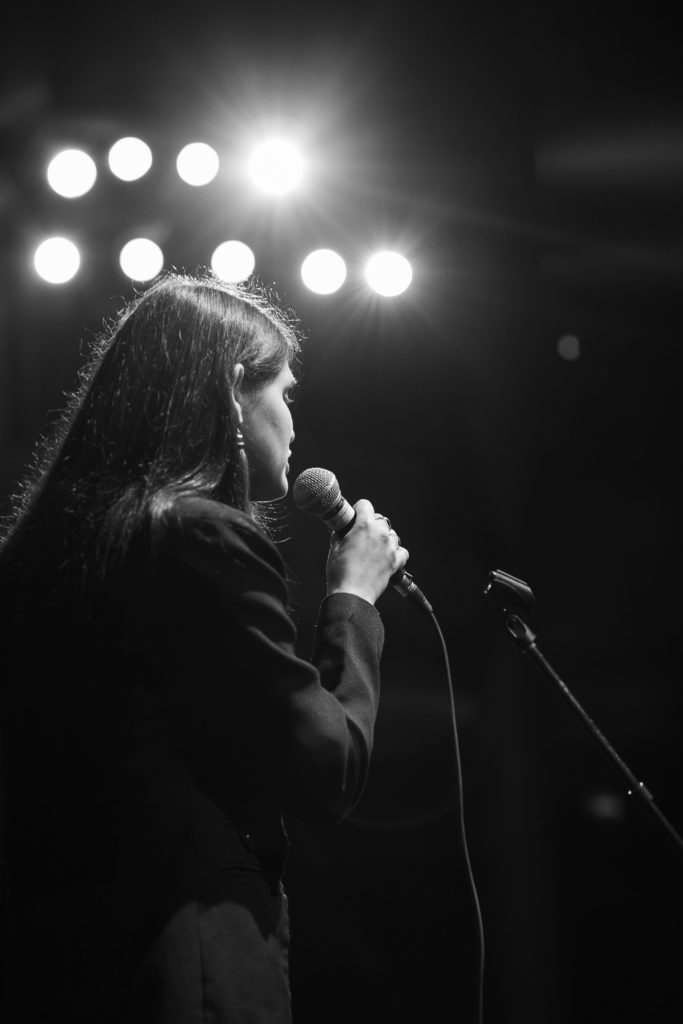- How can singers hear themselves when they sing?
- What are in-ear monitors and how do they work for singers?
- Review other reasons singers block one ear when they sing.
Have you ever wondered why singers block one ear when they’re singing live on stage?
You’re not alone on that.
Since many singers tend to cover one ear while performing, it can seem as though they’re doing it because everyone else does. Truth is, there’s a logic behind them doing so.
To find out more, we need to look into the kind of equipment singers use when they’re performing and how it works for them.

How Can Singers Hear Themselves When They Sing?
Singers wear special earpieces to hear themselves when they sing on stage or in front of a band or choir. These earpieces are called in-ear monitors. In-ear monitors allow singers to listen directly to the music in the background.
What Are In-Ear Monitors?
In-ear monitors (or in-ears for short) are professional audio devices designed to isolate certain sounds, music, or tracks. They look like small earbuds and are usually modified to fit the ears of the listener. These devices are referred to as “monitors” because they were initially developed for singers and musicians to keep track of audio sources from different places.
The origins of in-ear monitors can be traced back to the mid-1990s. Jerry Harvey, a monitor engineer was approached by drummer Alex Van Halen about the problems he faced with his earpiece. Since there was no way to improve the present in-ears then, Jerry decided to use his expertise to create the first custom dual-speaker in-ears molded to the impressions of Alex’s ears.
Throughout the decades, other sound engineers have improved and evolved the in-ears until they have become the modern version we know today, which is more accessible at a reasonable price.
How Do In-Ear Monitors Work for Singers?
At a concert or live performance, the speakers are positioned toward the crowd, which means they’re away from the stage and singer. So, the singer ends up hearing the sounds that bounce off the walls of the venue. This makes it difficult for them to follow the background music and do their job.
In-ear monitors basically eliminate the issue of hearing too much noise by providing the singer with a crystal-clear source of sound during their performance.
What Other Benefits Do In-Ear Monitors Provide to Singers?
Sound Consistency
Sounds can be very different depending on the shape or size of the room the singers perform in. Since singers move from one venue to another, they will be subjected to different sounds each time they’re at a new location, which could throw them off.
Different parts of the stage create different sounds, which can restrict mobility and prevent singers from performing efficiently.
In-ear monitors provide singers with a consistent high-quality mix regardless of the venue or the part of the stage they’re performing on.
Individual Mixes
To navigate a song smoothly, singers often rely heavily on one distinct element in the arrangement of a song. In-ear monitors allow singers to choose the mix of sounds they want to hear. This means that they get to hear themselves more prominently in the mix and pitch their notes correctly to the music.
With in-ear monitors, singers also can add audio cues and click tracks that the audience can’t hear for a more precise performance. Since singers are able to hear themselves better through the monitors, they won’t have to compete with the sound of the band or choir, which reduces vocal strain.
Hearing Health
Due to their line of work, singers constantly spend a lot of time in ear-splitting environments. Prolonged exposure to noise and music can cause them to experience some degree of hearing loss or tinnitus. Therefore, singers wear in-ears as hearing protection to reduce the risk of hearing damage.
In-ear monitors can efficiently block out external sound while allowing singers to listen to a clear mix at a sensible volume.
Additional Reasons Singers Block One Ear When They Sing
To Hear Themselves Better
Singers tend to cover one ear when they sing to hear their voices better and focus on their pitch. When they perform live, they are often accompanied by instrumental music, which can easily drown their voices out if they’re not loud enough. Concerts and stage performances also generally take place at noisy venues.
Singers need to be able to hear their notes and hit the right ones when they’re singing. If not, the harmonies between the singer and band will clash, resulting in a less-than-ideal performance. So covering one ear helps singers to differentiate their voice from the music and adjust their pitch accordingly.
Equipment Failure
In-ear monitors definitely come in handy for singers, but sometimes they can malfunction just like any equipment out there. In-ear monitors can become loose during a performance, causing the singer to press one ear. They could just not be loud enough, so the singer has to hold one ear to be able to hear the music.
On some occasions, the monitor can stop working completely, which causes the singer to revert to the old days of singing, with one ear closed.
Natural Reflexes
If a singer is used to covering one ear while they perform, it might become a natural reflex for them every time they sing after some time. Singers also usually cover one ear when they’re performing the climactic part of the song as the music gets louder at that point.
FAQ
Why Do Singers Pull Out Their Earpieces?
Singers generally pull out their earpieces because of equipment issues. Occasionally in-ear monitors will get faulty in the middle of a performance, leaving the singer unable to hear the monitor mix or live music. Problems with in-ears can also lead to poor monitor mix, which causes the singer to take out their earpieces and perform to the live music instead.
Since in-ear monitors block out all external sound, the singer won’t be able to hear the audience, making crowd participation difficult. Thus, if the singer wants to hear the crowd and get them to sing along to their song, they’d pull out their earpieces to hear the sounds around them better.
How Do Singers Protect Their Ears?
Since their profession requires them to be around loud noises most of the time, it’s important for singers to protect their ears from hearing loss. Some of the steps that singers take to protect their ears include going for regular health checkups with a specialized doctor. The doctor will be able to inform them about the condition of their ears and prescribe them proper treatment if they’re facing any hearing issues.
On the days they don’t perform, singers can take a break from listening to music and allow their ears to rest from all the noisy sounds. They also have more control of the volume of sounds around them as they don’t have to wear in-ear monitors and perform in front of loud, raucous crowds in their free time.
Wrapping Up
As you can see, singers generally block one ear when they’re singing out of natural reflex or because they want to hear their voices better when equipment failure occurs.
Now that you know why singers like to do this, watch how your favorite singers perform live. Do they also cover one ear while they’re singing? Have fun catching all these little details!


